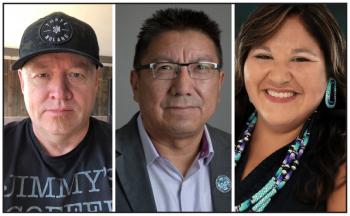Image Caption
Summary
Local Journalism Initiative Reporter
Windspeaker.com
As Indigenous Services Canada Minister Marc Miller committed to tackling anti-Indigenous racism in the healthcare system through new co-developed distinction-based Indigenous healthcare legislation, Tsi Snaihne District Chief Tobi Mitchell of the Mohawk Council of Akwesasne was telling Chiefs of Ontario (COO) that she is wary of the government tying anti-Indigenous racism in with writing the legislation.
“We just really want to note that this legislation isn’t the same as the topic of systemic racism in the healthcare system. It’s been kind of looped and tied together a little bit. But we really want to make sure we keep in mind that these two things are separate and both need to be looked at equally,” said Mitchell on the second day of the Special Chiefs Assembly virtual forum Feb. 4. Mitchell holds the portfolio for COO health care.
Miller, in a news conference also on Feb. 4, said “We are resolute in eliminating any Indigenous racism in the healthcare system. To achieve this we've launched the process to co-develop Indigenous health legislation. The legislation will aim to ensure Indigenous control of the development and delivery of their health services.”
In his comments, Miller referenced the discrimination experienced by Atikamekw woman Joyce Echaquan—recorded and posted it on social media—and the racism that has been voiced about Indigenous peoples in specific situations being prioritized for the coronavirus vaccine.
“One thing is clear, very clear: a significant amount of work remains to be done,” the minister said. “All Indigenous people must receive quality health services that are safe and free from racism and discrimination.”
Miller reiterated the commitment by the federal government in the 2020 fall economic statement of $15.6 million over two years to support the co-development of distinctions-based health legislation.
In late January, Miller held a second meeting with Indigenous leaders, select Cabinet ministers and provincial and territorial representatives to discuss combatting racism in the healthcare system.
Nishnawbe Aski Nation Grand Chief Alvin Fiddler said such meetings are “reactionary” and not necessarily helpful.
“With what happened with Joyce Echaquan, and the horrific experiences experienced by our people in the hospitals and other healthcare settings where the feds convene these emergency-type meetings and then announce that there’s going to be federal legislation on health respecting Indigenous First Nations jurisdiction, but we don’t know what that’s going to look like, how that’s going to get rolled out,” said Fiddler.
“Co-development is also of concern,” said Mitchell, who admitted she was not aware that COO had passed a resolution in 2019 rejecting the co-development process used by the federal government and the Assembly of First Nations.
“We’ve heard other jurisdictions that enter into (co-development) but essentially it all comes back to … who has ultimate control over fiscal resources. And it’s never us. It’s always somebody else,” said Mitchell.
Batchawana Chief Dean Sayers said that the only way the legislation could be distinction-based was if First Nations developed it themselves.
“(The Crown) make(s) buckets and buckets of money off our land and resources. We should be able to say to them ‘Give us our money. We’ll develop a health law, right through every component, including resourcing and enforcement, and once that’s done and we get the support from our people, you as the Crown will enter into a contribution agreement that will fund that and finance that throughout the duration of its life and that’s part of your fiduciary obligation,’” said Sayers.
Nipissing First Nation Chief Scott McLeod went a step further.
“There’s one big component I think that we have to not lose sight of when talking about the funding for health and the responsibility of the government, and that’s the liability that they have in the reconciliation for reversing the damages that have been caused by them to our communities,” said McLeod.
However, Mohawks of Bay of Quinte Chief R. Donald Maracle doubted that First Nations exerting their jurisdiction over health would automatically mean adequate funding from the federal government.
“They still see themselves as a discretionary funder of a program and services that they have the royal prerogative to fund at whatever level they choose,” said Maracle.
He suggested getting a legal opinion of what the Crown’s obligations are when it comes to funding Indigenous health care.
Mitchell said she would raise these points at the next AFN table, where co-development of federal health legislation is being discussed.
“I’m not completely on board with the AFN’s usual responses as well so these are things we will be pushing at and trying to implore and ensure that the work does get done, and then we may have to have those discussions further if these are things maybe we need to take on as well instead of leaving it to (the AFN),” said Mitchell.
Local Journalism Initiative Reporters are supported by a financial contribution made by the Government of Canada.

